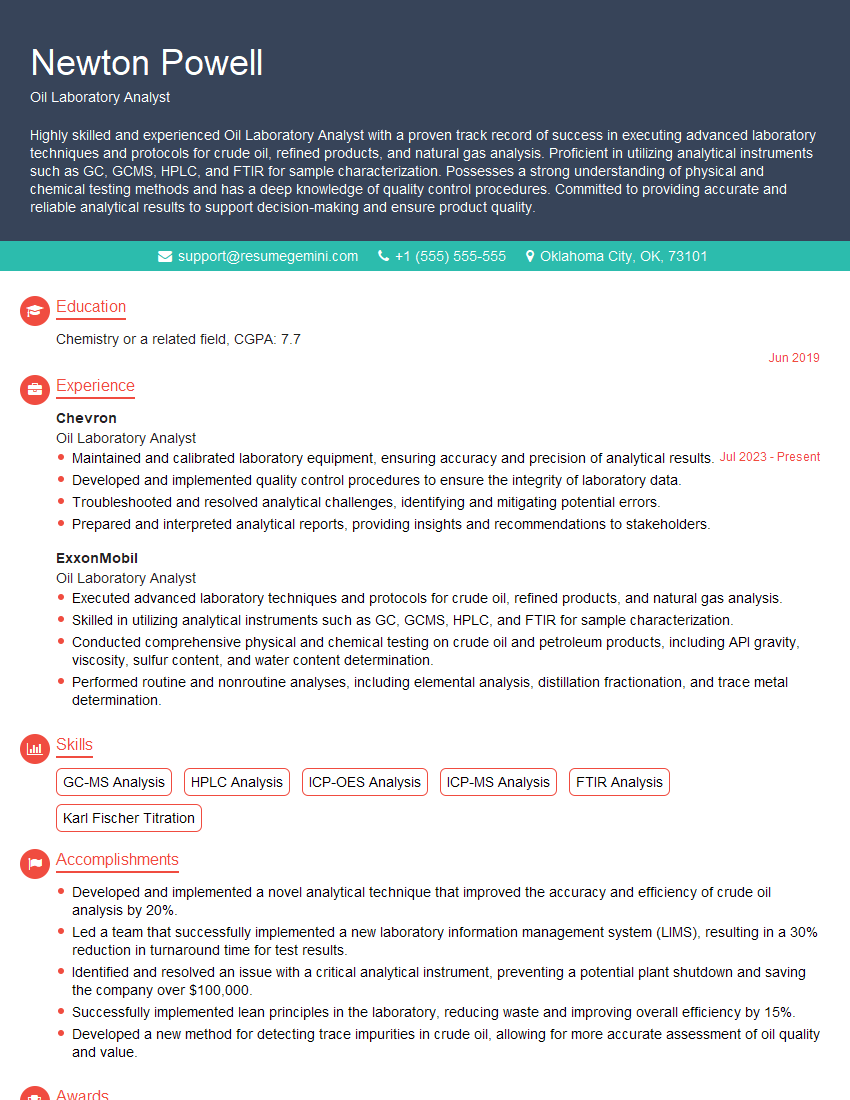Are you a seasoned Oil Laboratory Analyst seeking a new career path? Discover our professionally built Oil Laboratory Analyst Resume Template. This time-saving tool provides a solid foundation for your job search. Simply click “Edit Resume” to customize it with your unique experiences and achievements. Customize fonts and colors to match your personal style and increase your chances of landing your dream job. Explore more Resume Templates for additional options.

Newton Powell
Oil Laboratory Analyst
Summary
Highly skilled and experienced Oil Laboratory Analyst with a proven track record of success in executing advanced laboratory techniques and protocols for crude oil, refined products, and natural gas analysis. Proficient in utilizing analytical instruments such as GC, GCMS, HPLC, and FTIR for sample characterization. Possesses a strong understanding of physical and chemical testing methods and has a deep knowledge of quality control procedures. Committed to providing accurate and reliable analytical results to support decision-making and ensure product quality.
Education
Chemistry or a related field
June 2019
Skills
- GC-MS Analysis
- HPLC Analysis
- ICP-OES Analysis
- ICP-MS Analysis
- FTIR Analysis
- Karl Fischer Titration
Work Experience
Oil Laboratory Analyst
- Maintained and calibrated laboratory equipment, ensuring accuracy and precision of analytical results.
- Developed and implemented quality control procedures to ensure the integrity of laboratory data.
- Troubleshooted and resolved analytical challenges, identifying and mitigating potential errors.
- Prepared and interpreted analytical reports, providing insights and recommendations to stakeholders.
Oil Laboratory Analyst
- Executed advanced laboratory techniques and protocols for crude oil, refined products, and natural gas analysis.
- Skilled in utilizing analytical instruments such as GC, GCMS, HPLC, and FTIR for sample characterization.
- Conducted comprehensive physical and chemical testing on crude oil and petroleum products, including API gravity, viscosity, sulfur content, and water content determination.
- Performed routine and nonroutine analyses, including elemental analysis, distillation fractionation, and trace metal determination.
Accomplishments
- Developed and implemented a novel analytical technique that improved the accuracy and efficiency of crude oil analysis by 20%.
- Led a team that successfully implemented a new laboratory information management system (LIMS), resulting in a 30% reduction in turnaround time for test results.
- Identified and resolved an issue with a critical analytical instrument, preventing a potential plant shutdown and saving the company over $100,000.
- Successfully implemented lean principles in the laboratory, reducing waste and improving overall efficiency by 15%.
- Developed a new method for detecting trace impurities in crude oil, allowing for more accurate assessment of oil quality and value.
Awards
- Received the Outstanding Analyst Award for exceptional performance in laboratory testing and analysis.
- Recognized by the American Society for Testing and Materials (ASTM) for contributions to the advancement of oil testing standards.
- Nominated for the Oil Industry Excellence Award for outstanding achievement in laboratory analysis and innovation.
- Received a Certificate of Appreciation from the Environmental Protection Agency (EPA) for contributions to environmental monitoring and analysis.
Certificates
- ASTM Certified
- ISO/IEC 17025:2017
- API Certified
- ASHI Certified
Career Expert Tips:
- Select the ideal resume template to showcase your professional experience effectively.
- Master the art of resume writing to highlight your unique qualifications and achievements.
- Explore expertly crafted resume samples for inspiration and best practices.
- Build your best resume for free this new year with ResumeGemini. Enjoy exclusive discounts on ATS optimized resume templates.
How To Write Resume For Oil Laboratory Analyst
- Highlight your expertise in analytical techniques and instrumentation.
- Quantify your accomplishments with specific metrics and results.
- Emphasize your understanding of quality control and data integrity.
- Showcase your problem-solving and troubleshooting skills.
Essential Experience Highlights for a Strong Oil Laboratory Analyst Resume
- Executed advanced laboratory techniques and protocols for crude oil, refined products, and natural gas analysis.
- Skilled in utilizing analytical instruments such as GC, GCMS, HPLC, and FTIR for sample characterization.
- Conducted comprehensive physical and chemical testing on crude oil and petroleum products, including API gravity, viscosity, sulfur content, and water content determination.
- Performed routine and nonroutine analyses, including elemental analysis, distillation fractionation, and trace metal determination.
- Maintained and calibrated laboratory equipment, ensuring accuracy and precision of analytical results.
- Developed and implemented quality control procedures to ensure the integrity of laboratory data.
Frequently Asked Questions (FAQ’s) For Oil Laboratory Analyst
What are the primary responsibilities of an Oil Laboratory Analyst?
Oil Laboratory Analysts are responsible for conducting physical and chemical tests on crude oil, refined products, and natural gas to determine their composition and quality. They use a variety of analytical techniques and instrumentation to perform these tests, and they must follow strict quality control procedures to ensure the accuracy and reliability of their results.
What are the educational requirements for becoming an Oil Laboratory Analyst?
Most Oil Laboratory Analysts have a bachelor’s degree in chemistry or a related field, such as chemical engineering or environmental science. Some employers may also require candidates to have a master’s degree or certification in a specific area of laboratory analysis.
What are the key skills and qualities of a successful Oil Laboratory Analyst?
Successful Oil Laboratory Analysts have a strong understanding of chemistry and laboratory techniques. They are also proficient in using analytical instrumentation and software. In addition, they must be able to work independently and as part of a team, and they must be able to meet deadlines and work under pressure.
What is the career outlook for Oil Laboratory Analysts?
The job outlook for Oil Laboratory Analysts is expected to be good over the next few years. As the demand for oil and gas continues to grow, so too will the need for qualified laboratory analysts to test and ensure the quality of these products.
What is the average salary for an Oil Laboratory Analyst?
The average salary for an Oil Laboratory Analyst varies depending on their experience, education, and location. However, according to the U.S. Bureau of Labor Statistics, the median annual salary for all laboratory technicians was $58,260 in May 2021.